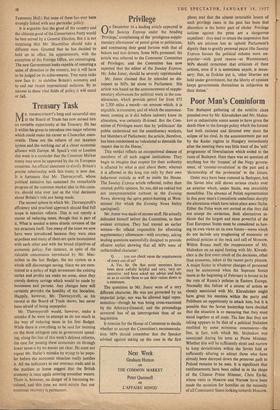Privilege
ON December 16 a leading article appeared in the Sunday Express under the heading 'Privilege,' complaining of the 'prodigious supple- mentary allowances' of petrol given to politicians, and contrasting their good fortune with that of bakers and taxi drivers. Some Ml's protested; the article was referred to the Commons' Committee of Privileges; and the Committee has now reported that the editor of the Sunday Express, Mr. John Junor, should be severely reprimanded.
Mr. Junor claimed that he intended no dis- respect to MPs, let alone to Parliament. His article was based on the announcement of supple- mentary allowances for political work in the con- stituencies, which provide petrol for from 875 to 2,500 miles a month—an amount which, it is arguable, is excessive; and of which the announce- ment, coming as it did before industry knew its allocation, was certainly ill-timed. But the Com- mittee of Privileges assert that by 'politicians' the public understand not the constituency workers, but Members of Parliament; the article, therefore, has been condemned as 'calculated to diminish the respect due to the House.'
This verdict reflects an occupational disease of members of all such august institutions. They begin to imagine that respect for their authority is affected by what is said about them; whereas it is affected in the long run only by their own behaviour outside as well as inside the House. The Sunday Express article reflected, rather than created; public opinion. So, too, did an unkind but not unrepresentative cartoon in the Evening News, showing the spivs petrol-hunting at West- minster (for which the Evening News feebly apologised).
Mr. Junor was made of sterner stuff. He actually defended himself before the Committee, to their evident irritation. They had treated an earlier witness—the official responsible for allocating supplementary allowances—with courtesy, asking leading questions successfully designed to provide effusive replies showing that all MPs were of unblemished character : Q. . . . you can check upon the requirements of every one of us?
A. Yes, Sir. On that point members have been most awfully helpful and very, very co- operative, and have asked my advice and help so as to enable them to can their ration down to a minimum.
The questions to Mr. Junor were of a very different character. He was not protected by an impartial judge, nor was he allowed legal repre- sentation—though he was being cross-examined by the Attorney-General; and the proceedings savoured less of an interrogation than of an inquisition.
It remains for the House of Commons to decide whether to accept the Committee's recommenda- tion. MPs should remember that the Speaker advised against taking up the case in the first
. place; and that the almost invariable lesson of such privilege cases in the past has been that discretion is the better part of choler. Privilege actions against the press are a dangerous expedient: they tend to create the impression that MPs are anxious less to uphold Parliament's dignity than to gratify personal pique (the Sunday Express houses the political column most un- popular—with good reason—at Westminster). MPs should remember that criticism of their actions, even if it is sometimes unjust, is neces- sary; that, as Erskine put it, 'other liberties are held under government, but the liberty of opinion keeps governments themselves in subjection to thcir duties.'


































 Previous page
Previous page